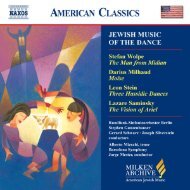Download Liner Notes PDF - Milken Archive of Jewish Music
Download Liner Notes PDF - Milken Archive of Jewish Music
Download Liner Notes PDF - Milken Archive of Jewish Music
Create successful ePaper yourself
Turn your PDF publications into a flip-book with our unique Google optimized e-Paper software.
For a time in the 1950s and 1960s Schonthal’s serious<br />
composing entered a phase <strong>of</strong> partial hiatus, as it<br />
became necessary for her to help with the support<br />
<strong>of</strong> her family. (By then she was married to an artist,<br />
with whom she had two sons, in addition to one<br />
with her first husband in Mexico.) She took several<br />
part-time teaching positions; played piano in bars,<br />
cocktail lounges, and supper clubs; and wrote<br />
popular songs and music for television commercials.<br />
By the early 1970s she was once again composing<br />
in earnest, and she was able to devote the major<br />
part <strong>of</strong> her artistic energies to new works and to<br />
the continued development <strong>of</strong> her stylistic approach<br />
and technical procedures.<br />
More romanticist than modernist, yet fully conversant<br />
with 20th-century developments, Schonthal pretty<br />
much resisted the sway <strong>of</strong> both the European and<br />
American avant-garde forces. But some <strong>of</strong> those<br />
influences are still to be found within her synthesized<br />
aesthetic, which includes many elements <strong>of</strong> the<br />
aggregate European musical tradition, Mexican folk<br />
music, aleatoric aspects, and even occasional nods<br />
to more recent so-called minimalism. She sees all<br />
these factors not as artistic ends in themselves, but as<br />
tools to serve her primary concern: the conveying <strong>of</strong><br />
emotion. By her own observation, she envisions her<br />
work “as a mirror held up to a world full <strong>of</strong> complex<br />
human emotions.” And she has acknowledged to<br />
students <strong>of</strong> her work that she conceives <strong>of</strong> music<br />
as a dense tapestry <strong>of</strong> musical associations in which<br />
the individual elements are “linked to each other in<br />
multiple, symbiotic relationships.”<br />
Schonthal has been the recipient <strong>of</strong> numerous<br />
commissions for chamber music, operas, symphonic<br />
works, and piano and organ pieces. Her large-scale<br />
works include a second piano concerto (1977) and her<br />
operas The Courtship <strong>of</strong> Camilla (A. A. Milne), and<br />
Jocasta (1996–97), to a libretto by Helene Cixous—a<br />
reworking <strong>of</strong> the Oedipus story (produced in New<br />
York in 1998) in which the two principal characters<br />
are each represented by an actor, a singer, and a<br />
dancer. Among her important smaller-scale piano<br />
compositions are Gestures (1978–79), which explores<br />
her idea <strong>of</strong> “emotional time” versus “metrical time”;<br />
Canticles <strong>of</strong> Hieronymus (1986), after paintings by<br />
Bosch; Self Portrait <strong>of</strong> the Artist as an Older Woman<br />
(1991); and From the Life <strong>of</strong> a Pious Woman (1999).<br />
Her chamber music, apart from the String Quartet<br />
no. 3 recorded here, includes traditional forms—such<br />
as her quartets nos. 1 (1962) and 2, In the Viennese<br />
Manner (1983); as well as creative combinations such<br />
as Collagen (1991), for soprano, flute, two clarinets,<br />
cello, piano, synthesizer, and percussion, based partly<br />
on the work <strong>of</strong> the Berlin Dada artist Hannah Hoech,<br />
a friend <strong>of</strong> her family’s in the 1930s; A Bird Flew Over<br />
Jerusalem (1992), for flute, piano, and electronic<br />
tape, which addresses a clash <strong>of</strong> cultures and religious<br />
traditions; Abendruhe mit süssem Traum (1993, rev.<br />
1996), for cello, piano, vibraphone, and timpani; and<br />
Bells <strong>of</strong> Sarajevo (1997), for clarinet and prepared<br />
piano. She has written a number <strong>of</strong> guitar works,<br />
including Fantasia in a Nostalgic Mood (1978) and<br />
Fantasy-Variations on a <strong>Jewish</strong> Liturgical Theme (1994,<br />
rev. 1997), for electric guitar. Her many songs and<br />
other vocal pieces have included settings <strong>of</strong> poetry<br />
<strong>of</strong> Lorca, Rilke, Yeats, Wordsworth, and Whitman—as<br />
well as some <strong>of</strong> her own.<br />
She has been honored with several important<br />
awards and citations, including the Internationaler<br />
Künstlerinnen Preis <strong>of</strong> the city <strong>of</strong> Heidelberg in 1994,<br />
and an exhibition at the Prinz Carl am Kornmarkt<br />
Museum was devoted to her life and work. In the<br />
United States she has received awards and grants from<br />
ASCAP (American Society <strong>of</strong> Composers and Publishers)<br />
and Meet the Composer. She has also served on the<br />
11 8.559451
















